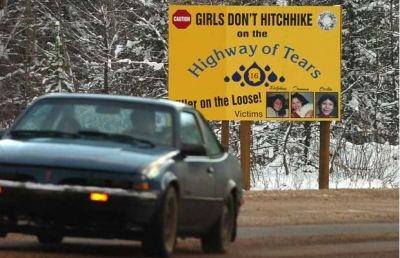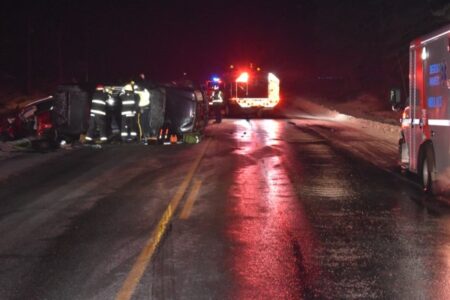Northern BC mayor pushes for transit on 'Highway of Tears'
By Ereic Doherty in the CommonSense Canadian.
Highway 16, also known as the Highway of Tears, has once again been in the news as new DNA technology allowed police to link a deceased sex offender to the 1974 murder of 16-year-old Colleen MacMillen of Lac La Hache, B.C., who disappeared while hitchhiking. Much of the media attention has focused on how amazing technology allowed police to solve a crime decades after it was committed and years after the murderer died.
However, very little attention has been paid to a forward-looking resolution by Smithers’ Mayor Taylor Bachrach which passed nearly unanimously at the Union of BC Municipalities convention in September. The Highway of Tears Safety Resolution calls for the provincial government to finally implement the recommendation of the 2006 Highway of Tears Symposium Recommendations Report for improved bus service between northern communities. The report points out that most of the murdered and missing are young indigenous women, and that most of the cases are unsolved.
Mayor Bachrach said in a telephone interview with The Common Sense Canadian that improved highway transit service would have “multiple benefits, not the least of which is women’s safety.” He expressed interest in directing carbon tax revenue to both passenger rail and highway bus service as a way to both reduce greenhouse gas emissions and improve safety.
Mayor Bachrach, who rides his bicycle for transportation in Smithers and was formerly a commuter on BC Transit’s bus service from the Village of Telkwa to Smithers, defies the stereotypes of rural BC residents as all being wedded to 4-wheel drive pickups. Unlike residents of Metro Vancouver, Bachrach sees the devastating impact of global warming in the form of dead pine trees killed by the pine beetle outbreak set loose by milder winters on a daily basis.
A few hours’ drive south on Highway 16 brings you to Burns Lake, where the local sawmill lies in ruins after an explosion caused by sawing dead pine trees the equipment was never designed to handle. The explosion killed two workers and leaves the economic future of the town in doubt as the timber supply shrinks and becomes less secure with the warming climate.
Without the income to buy and operate cars, young people will put themselves at risk hitchhiking if there is no reasonable and affordable alternative, and in recent years the provincial government has allowed companies including Greyhound to cut service to smaller communities. Owning and driving a car is just not affordable to many in BC’s interior, particularly indigenous youth. The high fares Greyhound charges for short and medium distance trips to smaller communities is a significant barrier to many, even if there is bus service when needed.
Highway bus and passenger train service is an essential safety service, preventing both crash deaths and death from violence, as well as being an essential environmental measure to reduce carbon emissions from excessive automobile use. It is time to put real pressure on the provincial and federal governments to fund good affordable highway bus and passenger train service across the province and country. Public transit is not just an urban issue.
Highway of Tears Safety Resolution – passed by UBCM delegates in Vancouver September 28, 2012:
WHEREAS a number of young women, mostly aboriginal, have been murdered or have gone missing along a stretch of Highway 16 in northern British Columbia now referred to as the “Highway of Tears”;
AND WHEREAS many of these missing women are believed to have been hitch hiking between communities where there is a lack of public transit:
THEREFORE BE IT RESOLVED that UBCM petition the British Columbia government to implement the recommendation of the Highway of Tears Symposium by establishing and funding a shuttle bus service between northern communities.
Eric Doherty is a transportation and environmental planner. In his consulting business, Ecopath Planning, Eric focuses on practical approaches for reducing greenhouse gas emissions and other environmental impacts, while improving community resiliency and livability. He blogs on transportation and environmental issues at the Livable Blog. He is also on the steering committee of the Vancouver / Burnaby Chapter of the Council of Canadians.
























Comments